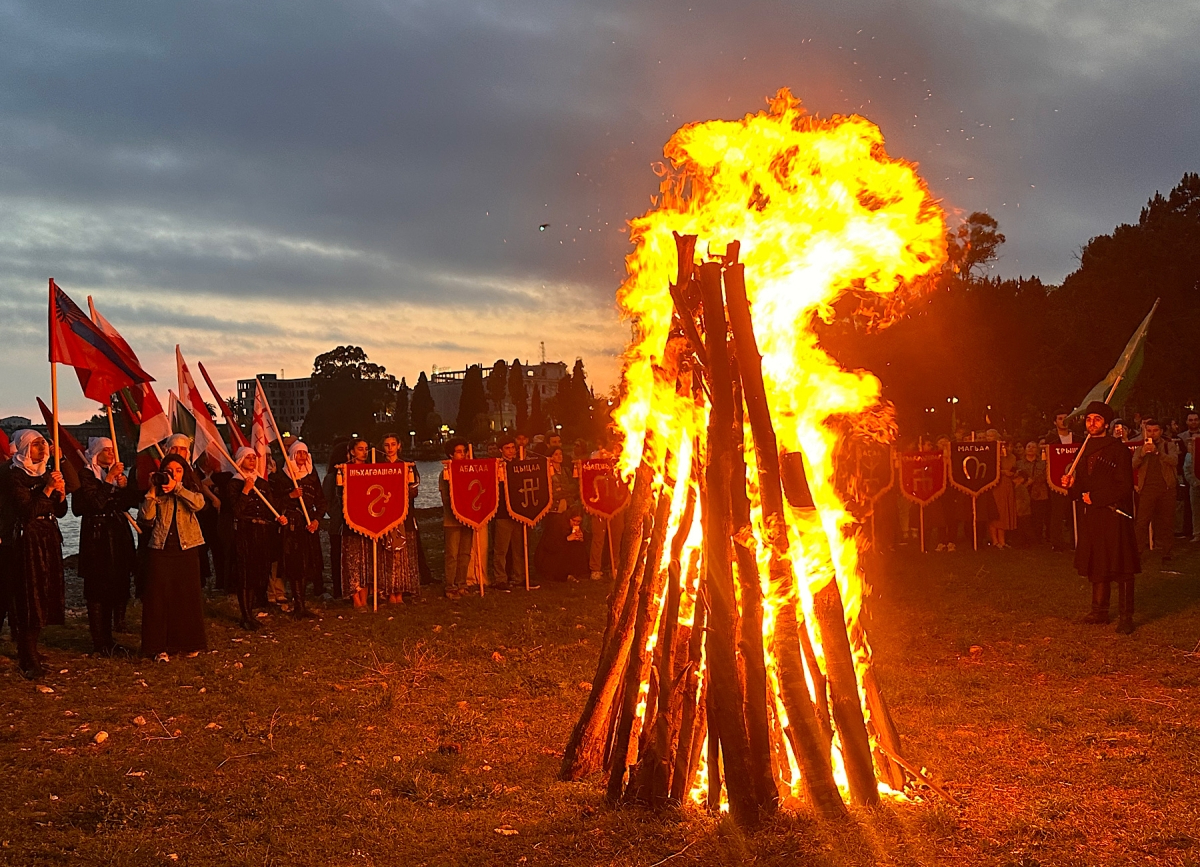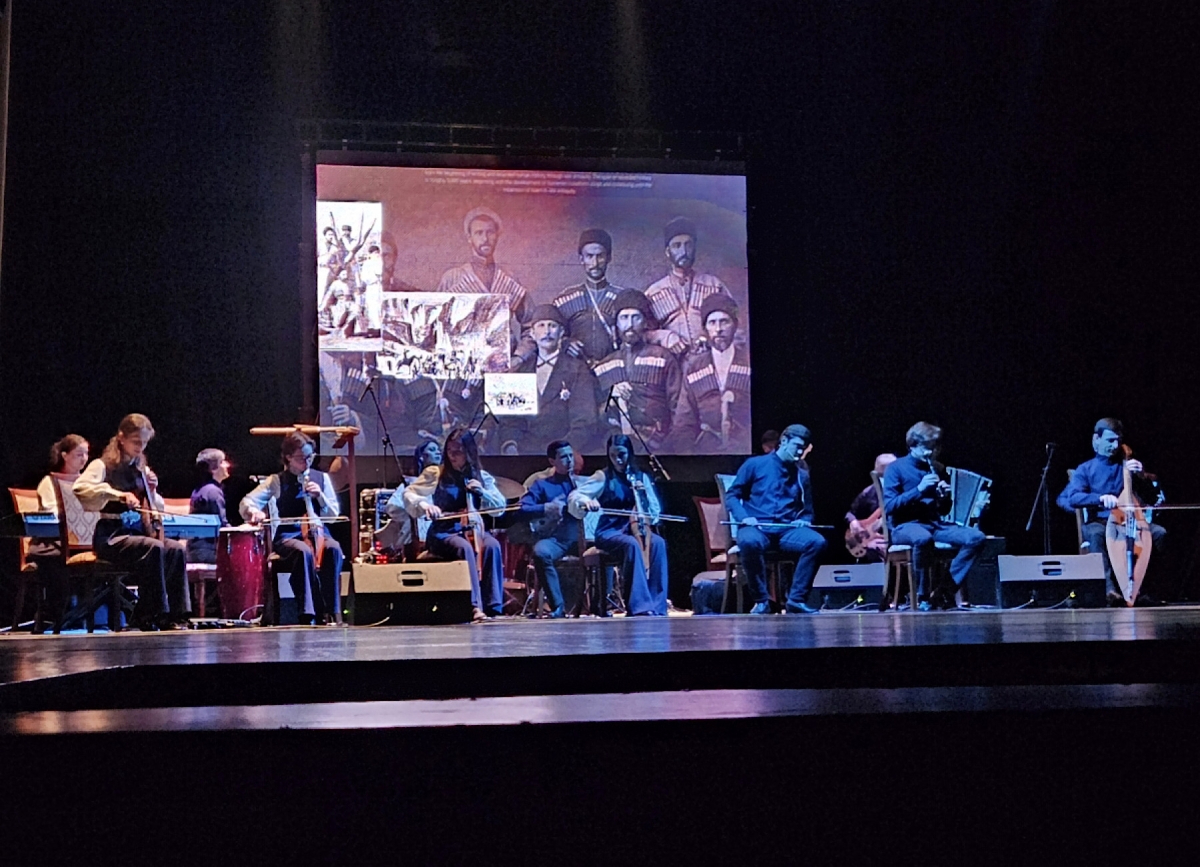21 May 1864-2024: 160 Years After the Russo-Caucasian War

The Russo-Caucasian, also known as the Caucasian War, officially ended on 21 May 1864.
SUKHUM / AQW'A ― Today marks a significant moment in the history of Abkhazia and the North Caucasian republics as we observe the 160th anniversary of the end of the Russo-Caucasian War, which officially ended on 21 May 1864. This date is solemnly remembered as the Day of Remembrance for the Victims of the Russo-Caucasian War. The conflict between the Russian Empire and the native peoples of the Caucasus led to significant population displacements, including those of the Abkhazians.
Historical Background
The Russo-Caucasian War, also known as the Caucasian War, spanned several decades and saw the Russian Empire confront various indigenous peoples of the Caucasus, including the Avars, Chechens, Circassians, Ubykhs, and Abkhazians. The war officially ended with a parade of Tsarist troops in a mountainous area now known as Krasnaya Polyana, marking a poignant moment in history.
Throughout the 19th century, the Russo-Caucasian War drastically reshaped the region's geopolitical landscape. This prolonged conflict between the Russian Empire and the indigenous peoples of the Caucasus, including the Abkhazians, resulted in substantial population displacements. The war led to the forced migration of many native communities, altering demographics and impacting the cultural and social fabric of the area.

Today, the memorial events began with a procession. Young people carrying Abkhazian and Circassian flags, along with torches, proceeded from Sergey Bagapsh Square to the Exile Monument on the promenade.
Commemorative Events
To honour this tragic chapter, a series of events have been organised by the State Committee for Repatriation and the State Committee for Youth and Sports. These events aim to pay tribute to the victims and reflect on the historical impact of the war.
At 6 PM, a memorial evening was held at the Abkhazian State Drama Theatre, followed by a youth procession from Sergey Bagapsh Square along the Mukhadzhir (Exile) Promenade. The evening concluded with a floral tribute at the 'Exile Memorial', a moment of silence at 8:15 PM, the lighting of the "Ashamaka" memorial candle, and the release of wreaths into the sea at 8:30 PM.

An evening in memory of the victims of the Russo-Caucasian War was held at the Abkhazian State Drama Theatre.
+ 160th Anniversary of the End of the Russo-Caucasian War
+ Pre-Soviet Abkhazia: Russian Imperialism, Makhadzhirstvo, and Menshevik Georgia
+ The Exodus of Abkhazians During the 19th Century: Resistance, Uprisings, and Exile
Scholarly Reflections
In conjunction with these memorial activities, the Abkhazian State University hosted a four-day International Scientific Conference titled "The Caucasian War: Lessons of History and Modernity," dedicated to the memory of renowned historian Georgy Dzidzaria. Scholars from various cities, including Moscow, St. Petersburg, Stavropol, Grozny, Makhachkala, Cherkessk and Maikop, gathered to present their research and perspectives.
The conference's opening speech, delivered by ASU Rector Aleko Gvaramiya, highlighted the 110th anniversary of Georgy Dzidzaria’s birth and his significant contributions to the historical understanding of the Caucasian War. Dzidzaria's monograph, "Muhadzhirism and the Problems in the History of Abkhazia in the 19th Century," remains a cornerstone in the study of this period.
Diverse Perspectives on Historical Interpretation
The report by Dr. Georgy Anchabadze, son of the renowned Abkhazian historian Zurab Achba (Anchabadze), and the first rector of Abkhazian State University, was also published by "Apsnypress." He refers to the conflict as the "Caucasian (Russian-Highland) War" and focused on how historical assessments of the events and figures have evolved over time in the Russian Empire and the USSR. Here are some excerpts:
"This was an era when the British and French colonial empires were expanding, and the USA was extending its borders to the Pacific Ocean. Similarly, the Russian government aimed to incorporate the Caucasus into its empire, believing any resistance could be suppressed by force. Consequently, Russian authors with official views depicted the war as the conquest of the region, emphasising the 'predatory' and religiously militant nature of the highlanders' actions.
The beginning of the Soviet period marked a break with imperial tradition. Marxist historians, drawing on the views of Marx, Engels, and Lenin, considered national liberation movements part of the global revolutionary process of the time and saw their leaders as representatives of the people's interests. However, they also noted that the incorporation of the Caucasus into Russia had progressive significance, accelerating capitalist development and fostering closer ties with the Russian people.
By the late 1940s, due to new political contexts in the USSR, there was a dramatic shift in the interpretation of events from a century earlier. Leaders like Shamil and other Caucasian figures were baselessly labeled as agents of Anglo-Turkish interests, and the Caucasian War was portrayed as a conflict instigated externally by Russia's enemies.
In the post-Stalin era, approaches to the Caucasian War changed once more. Historians became more cautious in their evaluations, returning to the ideas of colonial policy by Tsarism in the Caucasus and the liberating nature of the highlanders' resistance. Nevertheless, there was an emphasis on the voluntary association of almost all the region's peoples with Russia, without explaining why armed resistance continued for decades in some areas following this 'voluntary' annexation."

Georgi Anchabadze, Professor Emeritus of Historical Sciences, Ilia State University, School of Arts and Sciences.
However, the debates continued both during the Soviet and post-Soviet eras. Anchabadze continues:
"In 1983, the well-known Russian (Ossetian) historian M. M. Bliev introduced a new idea in Soviet historiography in an article published in one of the leading historical journals. According to Bliev, the Caucasian War was provoked by the predatory raids of the highlanders on Russian territories. He argued that the empire had to repel these raids by force, leading to a perpetual state of war in the Caucasus. This concept was fully developed in Bliev's monograph 'The Caucasian War,' co-authored with Professor V. V. Degoev. This perspective was not new: many Russian publicists and historians of the 19th century attributed the military advances of Tsarist troops to the 'predatory' nature of the highlanders, although they did not hide the expansionist ambitions of Tsarism (at that time, external expansion was considered a natural process). However, Bliev, justifying 19th-century geopolitics from a contemporary viewpoint, focused solely on the highlanders' raids, portraying the Russians as the defending side. He introduced the term 'raiding system of the highlanders,' essentially a euphemistic replacement for 'predation.' By attempting to explain the highlanders' military activity through their lifestyle and social structure, Bliev significantly underestimated the development of the peoples of the North Caucasus and Dagestan from the 18th to the 20th centuries. Most Caucasian scholars critically viewed this concept. In the second volume of the collective work 'History of the Peoples of the North Caucasus' (1988), which summarised the work of several generations of Soviet Caucasiologists, it was clearly stated regarding this hypothesis: 'The recent attempt to revive the notion of Chechens, Avars, and other highlanders as a homogenous mass with inherently aggressive and predatory tendencies did not receive support from Soviet historians.' However, later, amid the ethno-political conflicts of the post-Soviet period, Bliev's concept found followers among Russian historians and publicists. It was presented as though 'the economic basis of the Caucasian War was an exaggerated raiding system, compensating for the internal poverty of highland communities with external expansion, thus becoming a peculiar economic system.' The idea of the raiding system even made its way into school textbooks, which was unprecedented even during Stalin's time. For example, a 9th-grade textbook states that in the North Caucasus, raids were '...the main occupation of the male population because the mountainous terrain did not allow for active engagement in agriculture.'"
At a gathering in Sukhum, capital of Abkhazia, on 31 May 1990, 30,000 representatives of the Caucasian mountain peoples unanimously passed a resolution. This resolution acknowledged 21 May 1864, the day marking the end of the Russian-Caucasus War, as a day of remembrance for the war's victims and those who endured forced deportation.